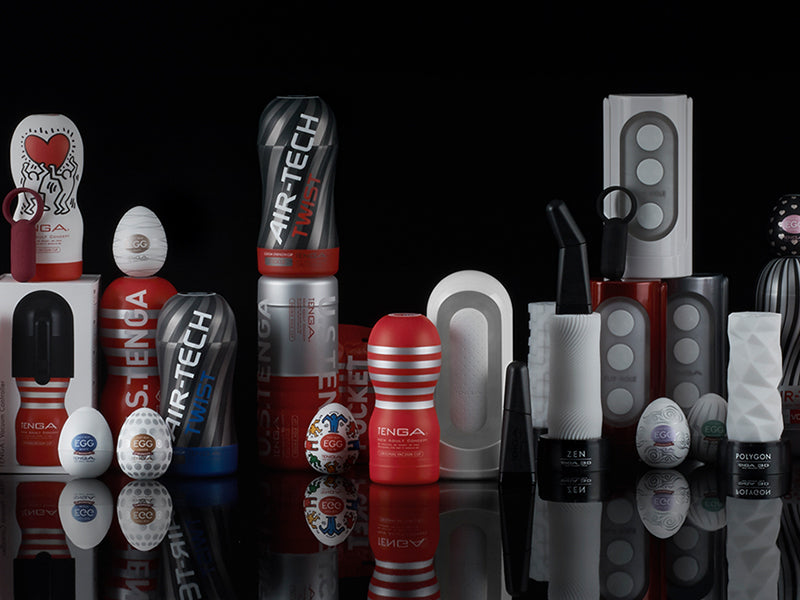At What Age Does A Man Stop Ejaculating?

While the enjoyment and value of sex and masturbation doesn’t only come from ejaculation, it is often the “end goal”, especially for couples who are trying to have children. For that reason, men may start to get nervous as they age about their ability to ejaculate, or even about the strength of their ejaculations decreasing.
There are a number of reasons why sexual functionality may fluctuate, with age being one of the more prominent factors due to its inevitability. However, aging affects everyone differently, as lifestyle and health factors will play into how your ejaculations change with time.
If you’re concerned about a sudden change in your sexual health or function, it may be worth considering consulting a medical professional. If you’re curious about how your ejaculations will fair with age, or if you’ve noticed a difference in a loved one’s ejaculations and are curious to learn more, continue reading this blog to learn more.
Contents
- What Exactly is Ejaculation?
- Common Factors That Affect Ejaculation Frequency In Men
- Maintaining Sexual Health As You Age
- Seeking Medical Help For Persistent Changes In Ejaculation
- Communication With Your Partner
- Conclusion: Embracing Changes In Sexual Function With Age
What Exactly is Ejaculation?
“Ejaculation” in a sexual context refers to ejecting (semen) in orgasm, meaning that there is a difference between “ejaculation” and “orgasm” that must be understood.
Orgasm refers to the altered state of consciousness that occurs at one’s sexual peak, which differs from ejaculation that is composed of two phases (emission and expulsion).
The first phase, emission, involves sperm moving from the testes and the epididymis to the urethra. The second phase, expulsion, is the phase that most are concerned about decreasing in strength with age, as it is this phase in which the semen moves through the penis and is expelled from the body through the urethra.
Common Factors That Affect Ejaculation Frequency In Men
There are several reasons men may find their general ejaculation frequency to decrease. Age is a key component to ejaculation frequency, in that partnered sex is shown to decline with each decade of advancing age, which results in lowered ejaculation frequency. This also demonstrates how relationship status can be a determining factor in ejaculation frequency.
While aging men still find pleasure from sexual relationships, their sex drive or libido levels are decreasing with age, making it less likely that they are ejaculating as frequently as they were in their early 20s.
The natural decrease in testosterone in men over time can also be attributed to changes in ejaculation. Less semen ejaculated and difficulty producing or maintaining an erection are results of having less testosterone, meaning that if you are having trouble with these or other ejaculation-related issues, it may be your testosterone levels that you will want to look into.
There is also the matter of the refractory period, which describes the amount of time between ejaculations. Because a man’s refractory period tends to increase with age, there is less of a chance that they will be ejaculating multiple times in one day, thus decreasing their ejaculation frequency.
Cultural background can also affect ejaculation frequency, in that there are cultures that find masturbation to be a taboo act. While here at TENGA STORE Europe, we’re strong supporters of masturbation and its health benefits, there are many whose beliefs lie in preventing the loss of semen, which obviously results in a lower ejaculation frequency.
Overall lifestyle factors that have general negative effects on your health will have similar negative effects to your ejaculation. Stress, smoking, and alcohol use can stifle your sexual health, thus lowering your ejaculation frequency in the process. Maintaining a healthy lifestyle, both in body and mind, is a key component in maintaining your sexual wellbeing.

Maintaining Sexual Health As You Age
If you’re hoping to maintain your sexual health into your later years, it is important to be conscious of your general body’s health as well as maintaining good mental health.
A healthy lifestyle often starts with a healthy diet. Balanced meals with nutrients that are vital to the body, and are especially useful for those who are aging, can make a positive difference in sexual health. These important nutrients include lean protein, fruits and vegetables, whole grains, and low-fat dairy. Switching to lean meats, brown rice, and low–fat milk may be what your diet is missing, thus affecting your ejaculations.
Staying hydrated is another important factor in maintaining your health. Water being good for the body is commonly known, and it also applies to sexual health. Especially in the matter of erectile dysfunction, it is proven that staying hydrated can help with maintaining an erection due to dehydration reducing blood volume and affecting mood.
Mental health is also very important to maintaining your sexual health. The negative physiological changes that stress can cause our body are unlikely to be of any help to those attempting to maintain the same level of erection and ejaculation that they had in their youth.
Psychiatric disorders such as anxiety disorders can cause changes to ejaculation frequency for a myriad of reasons. Panic disorders fall under these disorders, with a suggested 75% of patients with panic disorders reporting sexual dysfunction. Depression is also linked to decreased libido, which will lead to less sexual activity and less ejaculations.

Seeking Medical Help For Persistent Changes In Ejaculation
When you make visits to your doctor, be sure to bring up any issues you’ve noted with your sexual health. Your doctor will not make any judgments about you based on your sexual activity or sexual function, so feeling embarrassed to consult a professional should never be a notion.
If you’re having any trouble with sexual function, including low libido or a change in ejaculation frequency or strength, consult your primary care physician or a specialist such as a urologist in order to make sure you are taking care of your sexual health, and in turn your overall health.
There are several approaches a doctor may take when diagnosing your ejaculation issue. There are some medications that may be prescribed, however these are focused on the possible underlying issue of weak ejaculation. Examples of these medications and treatments would be amantadine bethanechol, bupropion, buspirone, cyproheptadine, yohimbine, and testosterone.
Ejaculation issues also sometimes may stem from issues with the pelvic floor muscles. Doing exercises known as Kegel exercises can help you strengthen these muscles and possibly be the solution to the ejaculation problems you are having. There are tutorials online both in written and video format, however, speaking to a medical professional about whether these sorts of exercises are safe for you to perform is recommended. There are also physical therapists who specialize in the pelvic floor muscles, so this may be an option for someone struggling with ejaculation issues.

Communication With Your Partner
Communication on multiple levels may affect your sexual well-being and thus allow you to continue to ejaculate with your partner into your later age.
Firstly, open communication is a prime method in diminishing anxiety, which is an often-cited cause for poor sexual functionality. Anxiety during sex may cause ejaculation issues such as erectile dysfunction, premature ejaculation, or delayed ejaculation, regardless of age. To avoid such issues, it is suggested that you open a conversation with your partner about how to maximize your comfort levels before engaging in sexual activity, and during the act itself. Finding this comfort with your partner may be the answer to regaining the ejaculation strength you might have lost over time.
Using communication to improve your relationship with your partner is beneficial not just for your sexual satisfaction, but for your overall general health, which as noted is another benefactor in ejaculation frequency.
Sexual communication, specifically sexual self-disclosure, is important in a relationship in order to find what sexual activities you and your partner are comfortable with and excited by. Without this self-disclosure, there’s a chance of simply repeatedly trying different sexual acts that aren’t quite your cup of tea, making it difficult to reach a point of ejaculation.

Conclusion: Embracing Changes In Sexual Function With Age
As we age, our bodies are constantly changing, which may lead to issues that we didn’t expect to arise. It’s important to keep tabs on the status of our sexual health, which is often linked to other aspects of our health and lifestyle. Although men’s sex drive and libido levels are decreasing with age, there is still plenty of enjoyment to be had in a changing sex life. Take the time to communicate with your partner about any changes that may be concerning you, as decreasing the anxiety around the issue can be beneficial to your sexual health.
Along with open communication and reducing anxiety, a healthy diet and frequent exercise can be helpful in your journey to strengthen your ejaculations. If you’re concerned about this change in your ejaculations due to such reasons as wanting to have children or being concerned that it is a sign towards a larger health issue, we recommend visiting a medical professional to diagnose your issue.
Lastly, if you’re testing your ejaculation strength or frequency through masturbation, the TENGA STORE Europe includes a variety of items suited for all ages and sizes that will notably improve your masturbation experiences!





